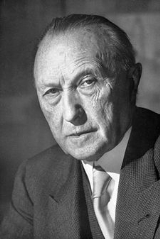
statesman. He was the chancellor of the West Germany from 1949 to 1963. He is widely recognised as a person who led his country from the ruins of World War II
to a powerful and prosperous nation that had forged close relations with old enemies France
, the United States
and Israel
. In his years in power Germany achieved prosperity, democracy, stability and respect.
We will never forget. If it takes us five or ten or twenty years, we will never rest until we get our revenge.![]()
I wish that an English statesman might once have spoken of us as Western Europeans. ![]()
Make Europe your revenge.![]()
In view of the fact that God limited the intelligence of man, it seems unfair that he did not also limit his stupidity.![]()
We all live under the same sky, but we don't all have the same horizon. In an instant age, perhaps we must relearn the ancient truth that patience, too, has its victories.![]()

